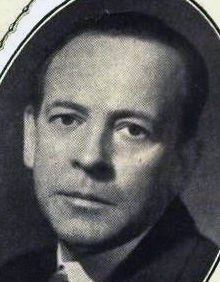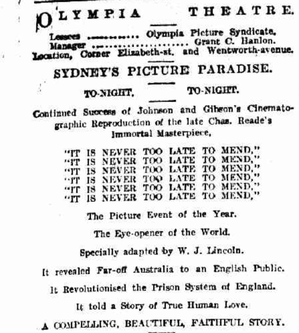Related Research Articles

The Athenaeum or Melbourne Athenaeum at 188 Collins Street is an art and cultural hub in the central business district of Melbourne, Victoria, Australia. Founded in 1839, it is the city's oldest cultural institution.

Frank Harvey was a British-born actor, producer, and writer, best known for his work in Australia.

Lovers and Luggers is a 1937 Australian film directed by Ken G. Hall. It is an adventure melodrama about a pianist who goes to Thursday Island to retrieve a valuable pearl.

Sunrise is a 1926 Australian silent film co-directed by Raymond Longford, who took over during filming.
The Man They Could Not Hang is a 1934 Australian film directed by Raymond Longford about the life of John Babbacombe Lee, whose story had been filmed previously in 1912 and 1921. These silent films were called "one of the greatest box-office features that ever came out of this country." The sound film was not as successful.

It Is Never Too Late to Mend is a 1911 Australian feature-length silent film written and directed by W. J. Lincoln.
The Mystery of the Hansom Cab is an Australian feature-length film directed by W. J. Lincoln based on the popular novel, which had also been adapted into a play. It was one of several films Lincoln made with the Tait family, who had produced The Story of the Kelly Gang.

The Life's Romance of Adam Lindsay Gordon is a 1916 Australian feature-length film directed by W. J. Lincoln, based on the life of poet Adam Lindsay Gordon.
Lincoln Cass Films was a short-lived Australian film production company.
The Sick Stockrider is a 1913 film directed by W. J. Lincoln based on the 1870 poem of the same title by Adam Lindsay Gordon. It was the first production from Lincoln-Cass Films and is one of the few Australian silent films to survive in its entirety.

The Double Event is a 1911 Australian feature-length film directed by W. J. Lincoln based on the first novel by Nat Gould, which had been adapted several times for the stage, notably by Bland Holt.
The Shattered Illusion is a 1928 Australian silent film about a rich financier who is shipwrecked. Unlike many Australian silent films, a copy of it exists today.
The Rushing Tide is a 1927 Australian silent film about the search for a hoard of diamonds. It was not a success at the box office and is considered a lost film.
The Cup Winner is a 1911 Australian silent film directed by Alfred Rolfe. It is set against a backdrop of horseracing and the finale involves real footage from the 1911 Melbourne Cup.
A Silent Witness is a 1912 Australian silent film directed by Franklyn Barrett. It is considered a lost film. It was a drama set in Sydney with Cyril Mackay as the hero.
Jewelled Nights is a 1925 Australian silent film directed by the film star Louise Lovely in collaboration with her husband Wilton Welch. Only part of the film survives today.
His Only Chance is a 1918 Australian silent film directed by Dick Shortland. It is a high society melodrama. As with Cupid Camouflaged, the film was made to aid fund raising for the Red Cross.
Yachts and Hearts, or The Opium Smugglers is a 1918 Australian silent film about opium smugglers in Sydney.

How We Beat the Emden is a 1915 Australian silent film directed by Alfred Rolfe about the Battle of Cocos during World War I. It features footage shot on Cocos Island.

Central Hall was a meeting room and theatrical hall, and later a cinema known as the Grosvenor Theatre, located at 201 Little Collins Street, in Melbourne, Australia, that operated from 1928 to 1968.
References
- ↑ "AUSTRALIAN FILMS". The Sunday Times . Perth: National Library of Australia. 30 March 1930. p. 11. Retrieved 7 August 2012.
- 1 2 Andrew Pike and Ross Cooper, Australian Film 1900–1977: A Guide to Feature Film Production, Melbourne: Oxford University Press, 1998, p152
- ↑ "Advertising". Portland Guardian . Vic.: National Library of Australia. 15 June 1931. p. 2 Edition: EVENING. Retrieved 7 August 2012.
- ↑ "Classified Advertising". The Argus . Melbourne: National Library of Australia. 21 March 1929. p. 20. Retrieved 7 August 2012.
- ↑ "Australian Pictures". The Argus . Melbourne: National Library of Australia. 7 June 1929. p. 10. Retrieved 7 August 2012.
- ↑ "AUSTRALIAN FILM". The Sydney Morning Herald . National Library of Australia. 22 May 1930. p. 11. Retrieved 7 August 2012.
- ↑ "SHADOW SHOWS The STATE THEATRES", The Bulletin, Sydney, N.S.W: John Haynes and J.F. Archibald, 26 March 1930, nla.obj-606684515, retrieved 14 July 2024– via Trove